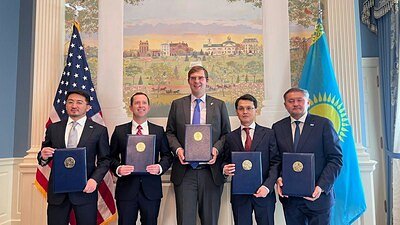
Kazakhstan Pioneers AI-Powered Education at National Scale with OpenAI Partnership
A landmark deal brings ChatGPT Edu to 165,000 Kazakh educators, marking a bold step towards digital transformation & raising questions about access, equity & the future of learning.
Kazakhstan Pioneers AI-Powered Education at National Scale with OpenAI Partnership
Washington D.C. – The Republic of Kazakhstan is taking a bold leap into the future of education, becoming one of the first nations globally to deploy AI-powered learning tools at a national scale. A recently signed agreement between the government, OpenAI, and financial powerhouse Freedom Holding Corp. will provide 165,000 educators with access to ChatGPT Edu – an enhanced version of the popular AI chatbot designed specifically for educational purposes.
While the promise of personalized learning and enhanced teaching efficiency is generating excitement, the initiative also raises important questions about equitable access, digital literacy, and the evolving role of educators in an increasingly automated landscape.
A National Initiative Rooted in Digital Transformation
The partnership, announced November 7th, is a cornerstone of Kazakhstan’s broader national strategy to embrace digital transformation and prepare its citizens for the future of work. The Ministry of Education and Science has been actively promoting the integration of technology into classrooms, and this initiative represents a significant acceleration of those efforts.
“Kazakhstan recognizes that investing in digital education is paramount to ensuring our students have the skills they need to thrive in the 21st century,” stated a government spokesperson. “This partnership with OpenAI and Freedom Holding Corp. allows us to rapidly scale access to cutting-edge AI tools and empower our educators to deliver more effective and personalized learning experiences.”
Freedom Holding Corp: Investing in Kazakhstan's Future
For Freedom Holding Corp. (NASDAQ: FRHC), a $10 billion+ international financial group with a strong presence in Kazakhstan, the initiative represents a strategic investment in the country’s future. The company is financing the deployment of ChatGPT Edu and the associated infrastructure through the BilimClass platform – a widely adopted digital learning resource already used across the nation.
“We see this as an opportunity to not only support education but also to contribute to the development of a skilled workforce in Kazakhstan,” explained a source within Freedom Holding Corp. “Investing in digital literacy and AI capabilities is crucial for driving economic growth and competitiveness.”
However, the company’s involvement also raises questions about the intersection of private investment and public education. Critics point to the need for transparency and accountability to ensure that the initiative serves the best interests of students and educators, rather than being driven by corporate profit.
ChatGPT Edu: Empowering Educators, Personalizing Learning
ChatGPT Edu offers a suite of features designed to enhance teaching and personalize learning. These include unlimited document uploading, personalized AI assistants for students, and seamless integration with existing Learning Management Systems (LMS).
“The potential of this technology to support educators is immense,” shared an anonymous educator involved in pilot testing. “It can automate repetitive tasks, provide individualized feedback to students, and free up teachers to focus on higher-level instruction.”
However, concerns remain about the need for adequate training and support to ensure that educators can effectively integrate ChatGPT Edu into their classrooms. The rapid pace of technological change also raises questions about the sustainability of the initiative and the need for ongoing investment in professional development.
Addressing Equity and Access Challenges
While the initiative holds great promise, it also faces significant challenges related to equity and access. Despite progress in expanding digital infrastructure, disparities in internet connectivity and access to technology persist across Kazakhstan, particularly in rural and remote areas.
“Ensuring that all students have equal access to these tools is critical,” stated a researcher specializing in educational technology. “We need to address the digital divide and provide the necessary support to students and educators in underserved communities.”
Furthermore, concerns have been raised about the potential for algorithmic bias and the need to ensure that ChatGPT Edu is culturally sensitive and inclusive. The platform’s responses must reflect a diverse range of perspectives and avoid perpetuating harmful stereotypes.
The Evolving Role of Educators in the Age of AI
Perhaps the most profound question raised by this initiative is the evolving role of educators in the age of AI. As AI-powered tools become increasingly sophisticated, the traditional model of teaching and learning may need to be re-evaluated.
“The role of the teacher is not going to disappear, but it will evolve,” explained an education policy analyst. “Teachers will need to become facilitators of learning, curators of knowledge, and mentors who guide students in navigating a complex and rapidly changing world.”
The success of this initiative will ultimately depend on the ability to address these challenges and ensure that AI-powered tools are used to enhance, rather than replace, the human element of education.
Kazakhstan's bold move positions it as a pioneer in the global effort to harness the power of AI for the benefit of all learners. Whether this initiative will truly deliver on its promise remains to be seen, but it undoubtedly marks a significant step towards the future of education.
